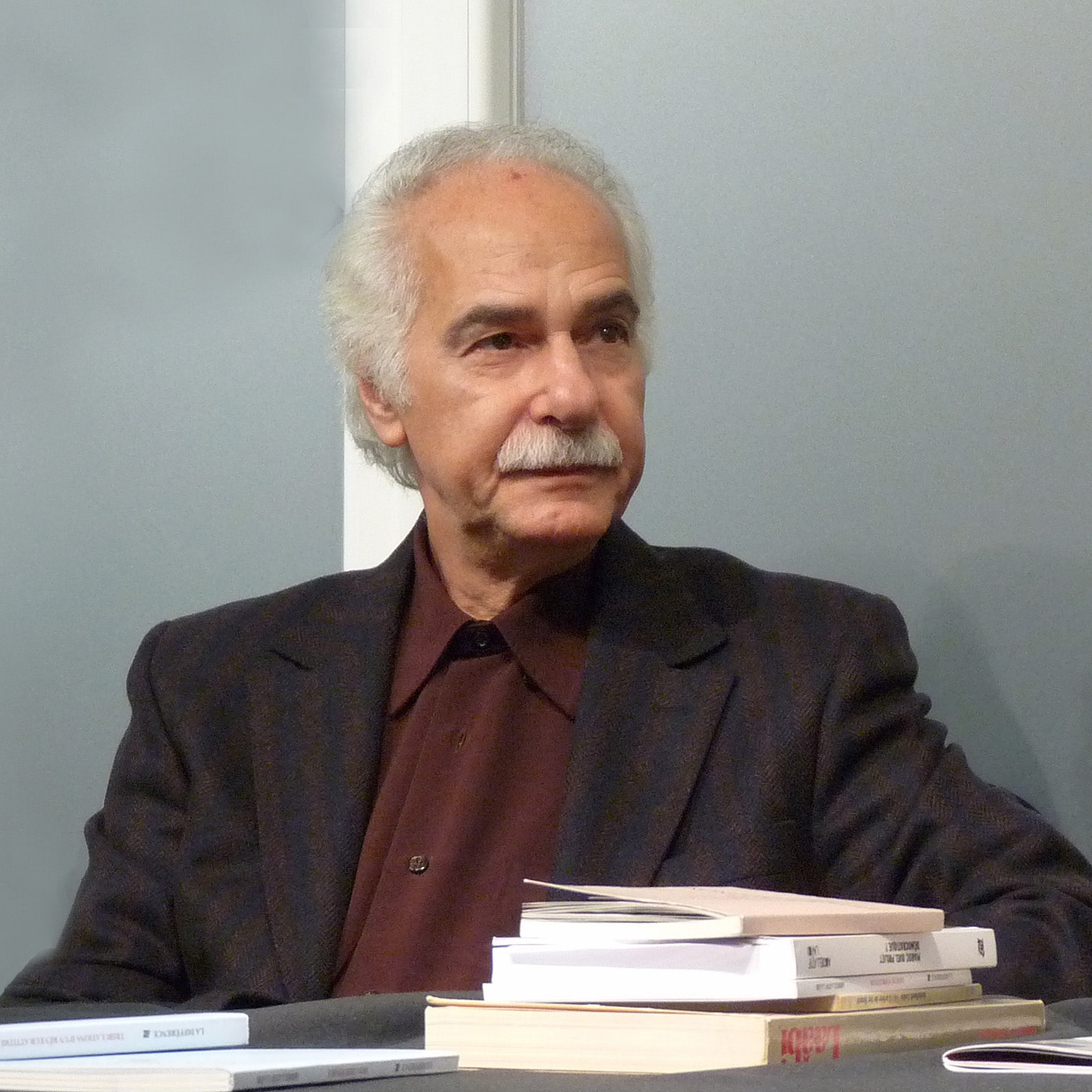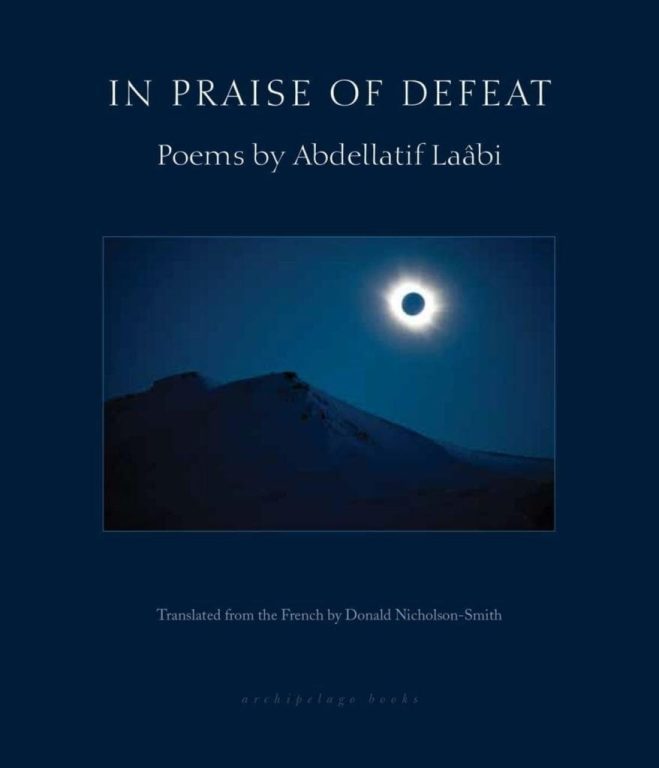
Abdellatif Laâbi, poet, novelist, playwright, translator, and political activist, was born in Fez, Morocco in 1942. He was the founder of Souffles, a left-leaning literary review banned by the Moroccan government in 1972. An outspoken critic of the authoritarian and theocratic regimes of the Maghreb, Laâbi was imprisoned in Morocco for eight years and later exiled to France. Deemed by Amnesty International a prisoner of conscience, Laâbi received the Prix de la Liberté and the Prix International de Poésie while imprisoned. He went on to receive the Prix Robert Ganzo de Poésie in 2008, the Prix Goncourt de la Poésie for his Œuvre complète in 2009, and the Grand Prix de la Francophonie from the Académie Française in 2011.

Judges’ Citation
In this bilingual book (Laâbi’s original French and Nicolson-Smith’s English) – a book that is monumental both in size (over 800 pages) and in scope – we meet one of the major poets of our time, one who has lived through great and catastrophic events and responded to them with a passionate intelligent humanity.
In this bilingual book (Laâbi’s original French and Nicolson-Smith’s English) – a book that is monumental both in size (over 800 pages) and in scope – we meet one of the major poets of our time, one who has lived through great and catastrophic events and responded to them with a passionate intelligent humanity. Laâbi can move from the simplest short poems about the delights of the body to complex meditations on war, violence and prison. That he does so in such an open, generous voice (so well communicated by the dedicated translator, since this must have been an epic labour of love for him) is one of the admirable aspects of Laâbi’s mind and art. The rhetorical pitch is perfectly judged. There is nothing glib about the eloquence, nor is there anything uncontrolled or self-indulgent about the fury when it rises. The poems are public in the best sense in that they address the reader as an equal, not as from a tower but in the street. The interest in Laâbi’s work is intense and growing and other fine books of translations from his work have become available. But this is a landmark.
Selected poems
by Abdellatif Laabi
Write, write, never stop. Tonight and all the nights to come. When I am at last face to face with myself. And must take stock. No more uniform. No longer distractedly pacing a measured area for the regulation exercise period. No more obeying wretched orders. My number still on the other side of the door. When I am done with drinking, eating, urinating, defecating. Done with talking, with calling things by their worn-out names. I light endless cigarettes whose smoke emerges from my lungs in broken chains, bitter swirls of rejection. Prison night has gobbled up the artificial light of the day. Ragged stars populate the vault of my visions.
Write.
When I stop, my voice begins to sound very peculiar. As though unknown notes were clinging to its cords, driven by strange storms from all those zones where life and death watch and spy on one another, two oddly hued wild animals, each crouched ready to spring, ready to slash and destroy the other’s essential nature.
Write.
I can live now only by wrenching myself away from myself, by wrenching away from myself my points of rupture and suture, those places where I most acutely feel splits and junctures, where I cut myself into pieces so as to return to life in unfathomable elsewheres: earth, roots, trees of intensity, granular effervescene under the sun.
Copyright © 2016 by Donald Nicholson-Smith (translation of French written by Abdellatif Laâbi), In Praise of Defeat, Archipelago Books
from “Chronicle of the Citadel of Exile”
the French written by Abdellatif Laabi
Good morning sun of my land
how good it feels to be alive today
so much light
so much light around me
Good morning empty exercise yard
you have become familiar to me
I cross you with a lively step
and you suit me like an elegant shoe
Good morning ponderous and philosophical oxpecker
perched up there
on the wall that hides the world from me
poking at your ribcage
with distracted little movements
Good morning sparse grass in the alley
quivering in opalescent flurries
at the wind’s teasing touch
Good morning great lone palm
erect on your cross-grained trunk
blooming at your peak
like a glorious tulip
Good morning sun of my land
tide of presence abolishing exile
So much light
so much light around me
* * *
I have a thousand reasons to live
to vanquish day-to-day death
the joy of loving you
and walking in step with hope
* * *
So many years
without ever knowing
solitude or boredom
so many shooting stars in my head
The reservoir of tenderness hums
in plainsong chant
the prisoner’s peculiar happiness
(. . . )
Copyright © 2016 by Donald Nicholson-Smith (translation of French written by Abdellatif Laâbi), In Praise of Defeat, Archipelago Books
from “Good Morning Sun of My Land”
the French written by Abdellatif Laabi
My double
an old acquaintance
whom I visit with moderation
He is a shameless fellow
who plays on my shyness
and has the knack of profiting
from my distractedness
He is the shadow
who follows or precedes me
aping my walk
He even winkles his way into my dreams
and speaks the language of my demons
fluently
Despite our close intimacy
he is still a stranger to me
I neither hate nor love him
for after all
he is my double
the proof by default
of my existence
Copyright © 2016 by Donald Nicholson-Smith (translation of French written by Abdellatif Laâbi), In Praise of Defeat, Archipelago Books
from “My Dear Double”
the French written by Abdellatif Laabi
How easy the inquisitor’s questions are! Compare them, he says, with the questions I sometimes dare not ask myself:
What hidden tribe gave you gangrene?
Are you utterly untainted by power?
Have you broken all the mirrors?
From what weaknesses do you draw your strength?
What taboos govern your rectitude?
Why do you pay lip service to the scope of your ignorance?
Do you not sometimes settle for a mere approximation of what you really wanted to say? Are you not sometimes annoyed by your own most righteous passions? Do you know not sometimes tend to curse your fine reasons for living?
Are you not a little prone to play the martyr?
Copyright © 2016
from “Skinned Alive”
the French written by Abdellatif Laabi
How easy the inquisitor’s questions are!
Compare them, he says, with the questions
I sometimes dare not ask myself:
What hidden tribe gave you gangrene?
Are you utterly untainted by power?
Have you broken all the mirrors?
From what weaknesses do you draw your strength?
What taboos govern your rectitude?
Why do you pay only lip service to the scope of your ignorance?
Do you not sometimes settle for a mere approximation of what you really wanted to say? Are you not sometimes annoyed by your own most righteous passions? Do you not sometimes tend to curse your fine reasons for living?
Are you not a little prone to play the martyr?
Copyright © English language Donald Nicholson-Smith, 2016
from Skinned Alive
the French written by Abdellatif Laabi
Good morning sun of my land
how good it feels to be alive today
so much light
so much light around me
Good morning empty exercise yard
you have become familiar to me
I cross you with a lively step
and you suit me like an elegant shoe
Good morning ponderous and philosophical oxpecker
perched up there
on the wall that hides the world from me
poking at your ribcage
with distracted little movements
Good morning sparse grass in the alley
quivering in opalescent flurries
at the wind’s teasing touch
Good morning great lone palm
erect on your cross-grained trunk
blooming at your peak
like a glorious tulip
Good morning sun of my land
tide of presence abolishing exile
So much light
so much light around me
***
I have a thousand reasons to live
to vanquish day-to-day death
the joy of loving you
and walking in step with hope
***
Copyright © English language Donald Nicholson-Smith, 2016
Good Morning Sun of My Land
the French written by Abdellatif Laabi